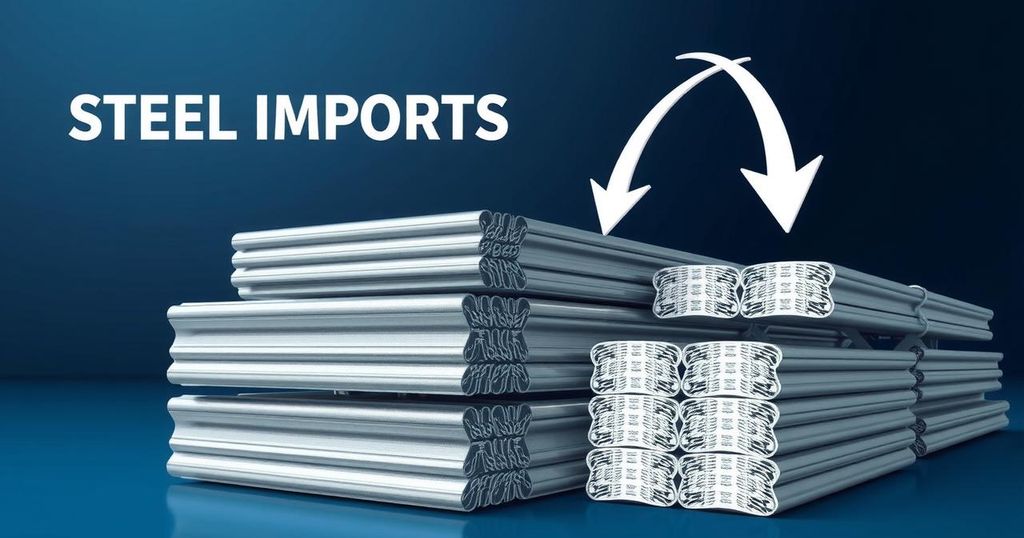Nigeria’s $4 Billion Steel Imports: Pathway to Self-Sufficiency and Industrial Growth

Nigeria imports approximately $4 billion worth of steel annually. The Minister of Steel Development, Prince Shuaibu Abubakar Audu, advocates for import substitution to relieve pressure on foreign exchange. The Development Agenda for Western Nigeria (DAWN) reveals the Southwest region’s significant expenditure on red meat, prompting calls for local production involvement. Efforts are underway to boost steel production capacity and establish military hardware manufacturing in Nigeria.
Nigeria is currently spending approximately $4 billion annually on steel imports, according to Prince Shuaibu Abubakar Audu, the Minister of Steel Development. He emphasized the urgent need for import substitution to alleviate pressure on the country’s foreign exchange reserves during his visit to the National Steel Raw Materials Exploration Agency (NSRMEA) in Kaduna. Audu expressed the significance of maximizing the agency’s operational capacity as a cornerstone in achieving Nigeria’s economic growth target of $1 trillion by 2030.
The minister acknowledged NSRMEA’s commendable performance, citing it as one of the best-performing agencies within the ministry. Additionally, he revealed plans to collaborate with the Ministry of Defence and the Defence Industries Corporation of Nigeria (DICON) for the production of military equipment, which aligns with the government’s broader strategic objectives.
In another significant statement, the Development Agenda for Western Nigeria (DAWN) Commission indicated that the Southwest region expends over N800 billion monthly on red meat. Dr. Seye Oyeleye, the Director-General of DAWN, highlighted that approximately 10,000 cows are slaughtered daily in this region, with Lagos alone consuming around 7,000 cows each day. This consumption leads to staggering financial implications, amounting to approximately N40 billion daily.
Dr. Oyeleye underscored the irony that while Southwest Nigeria is the largest consumer of livestock products, the region predominantly sources its meat from outside. He advocated for regional stakeholders to actively engage in livestock production to foster economic empowerment, given the available arable land and technology.
Moreover, he emphasized the urgency of advancing the livestock sector within the region, as well as the production of essential products like meat, milk, and poultry. DAWN has also proposed a comprehensive ten-year livestock development strategy to address these challenges.
Regarding the Community-Led Development Toolkit (COLDET), Dr. Oyeleye articulated commitment to sustainable development through community empowerment. He illustrated that COLDET fosters local stakeholders’ involvement in assessing community needs and prioritizing projects, which is paramount to sustainable progress.
Chairman of the AGDF Steering Committee, Dr. Tunji Olugbodi, expressed anticipation for the collaboration, noting the initiative’s potential to rejuvenate community development strategies. He affirmed that COLDET represents a paradigm shift from traditional top-down approaches.
In addition, Audu commented on President Bola Tinubu’s goals to rehabilitate the Ajaokuta Steel Company and establish a military-industrial complex in Nigeria. He mentioned that a memorandum of understanding (MoU) regarding military hardware production is awaiting presidential approval.
Audu also outlined efforts to organize Nigeria’s first steel summit to unite stakeholders for a unified growth plan and discussed advancements pertaining to the Metallurgical Industry Bill, which aims to provide a regulatory framework for the sector.
Highlighting the efforts to attract foreign direct investment, the minister detailed commitments made during President Tinubu’s trip to New Delhi regarding the production of five million metric tons of steel and a $300 million investment by a Chinese company in Ogun State.
Audu revealed strategic plans aimed at producing 10 million metric tons of steel annually within five years, which would significantly diminish Nigeria’s dependency on imports. While discussing DICON’s military hardware initiatives, Maj Gen Aniedi Edet acknowledged the financial burdens associated with hardware imports and expressed confidence in the partnership with the Steel Development Ministry to fulfill domestic production needs and potential exports.
The Minister also visited former President Muhammadu Buhari and engaged with Deputy Governor Dr. Hadiza Balarabe, articulating his mission and initiatives during his time in Kaduna.
In summary, Nigeria’s annual expenditure of $4 billion on steel imports underscores a pressing need for import substitution to enhance its economic stability. The collaboration between the steel industry and military sectors signifies a strategic approach to bolster national production capabilities. Additionally, initiatives such as COLDET illustrate a commitment to sustainable community development while addressing livestock production challenges. With a focus on increasing domestic production, Nigeria aims to reduce reliance on imports and achieve significant advancements in its industrial capabilities.
Original Source: economicconfidential.com








